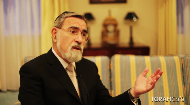
Duluth, Minnesota (OpEdNews) October 10, 2016: Because OEN's Rob Kall is enormously fascinated with bottom-up imagery, I am hereby dedicating the present essay to him, because at the end I discuss bottom-up spirituality -- both individual personal bottom-up spirituality and collective bottom-up spirituality.
My favorite scholar is the American Jesuit cultural historian and theorist Walter J. Ong (1912-2003). In his massively researched book Ramus, Method, and the Decay of Dialogue: From the Art of Discourse to the Art of Reason (Harvard University Press, 1958), Ong works with the aural-visual contrast that he explicitly acknowledges (page 338, note 54) borrowing from the French philosopher Louis Lavelle (1883-1951). The aural-visual contrast is also known as the sound-sight contrast, and as the hearing-seeing contrast. Briefly, Ong aligns the kind of philosophical thought that emerged in Plato and Aristotle with the visual polarity in the aural-visual contrast -- that is, with cognitive processing adapted to visual orientations of thought.
No doubt Ong's claim about the visual cognitive processing involved in the philosophical thought exemplified by Plato and Aristotle is strengthened by Andrea Wilson Nightingale's book Spectacles of Truth in Classical Greek Philosophy: Theoria in Its Cultural Context (Cambridge University Press, 2004).
After the publication of the classicist Eric A. Havelock's book Preface to Plato (Belknap Press of Harvard University Press, 1963), Ong himself switched to referring to orality-literacy contrasts. Ong never tired of referring to Havelock's 1963 book (and his later works). Havelock uses the term imagistic thinking to characterize the kind of thinking in the Homeric epics out of oral tradition -- and by extension, all thinking in primary oral cultures. Of course imagistic thinking involves images and the imagination. Over the centuries in Western culture, images were used to aid memory.
For Ong, then, the literacy polarity in the orality-literacy contrast refers to the distinctively literate thought that emerged historically in Plato's and Aristotle's philosophical dialectical thought and has persisted in our Western philosophical tradition of thought. However, we should note here that images can also be found in the short narratives in Plato's dialogues. See John Alexander Stewart's bilingual compilation in his 1905 book The Myths of Plato (London: Macmillan).
But what about the thought in the Hebrew Bible? The Hebrew Bible is not an anthology of Greek philosophical thought. But it was obviously written down in a form of the phonetic alphabetic writing system that was eventually adapted into the vowelized phonetic alphabetic writing system used in ancient Greece to transcribe the Homeric epics and later used by Plato and Aristotle.
Now, the various contributors in the volume edited by Werner H. Kelber and Paula A. Sanders, Oral-Scribal Dimensions of Scripture, Piety, and Practice: Judaism, Christianity, Islam (Cascade Books/ Wipf and Stock Publishers, 2016), are for the most part NOT focused on the distinctively literate thought exemplified by Plato and Aristotle.
For Ong, the Hebrew Bible is mostly an anthology of primary oral thought and expression that got written down, but this does NOT mean that there are no key ways in which biblical thought and expression can be differentiated and distinguished. But in Havelock's terminology, biblical thought and expression involve imagistic thinking -- not the kind of philosophical thinking exemplified by Plato and Aristotle. Moreover, for Ong, the ways in which the various books of the Hebrew Bible are composed can be aligned with various ways in which primary oral thought and expression are composed.
However, for Ong, the work of the historian Mircea Eliade is important for differentiating the Hebrew Bible from the various forms of primary oral thought and expression (i.e., pre-literate thought and expression). As Ong notes, Eliade credits the Hebrew Bible with moving decisively away from the cyclic thought found in myths by introducing the distinctly historical sense of time.
In Ong's two 1967 books In the Human Grain: Further Explorations of Contemporary Culture (Macmillan) and The Presence of the Word: Some Prolegomena for Cultural and Religious History (Yale University Press), the expanded version of his 1964 Terry Lectures at Yale University, Ong discusses Eliade's claim. See the indexes of Ong's two 1967 books for specific page references regarding Eliade.
Incidentally, cyclic thought can be found in Plato's dialogue known as the Republic in the myth of Er that Socrates recounts. In this respect, and perhaps in certain other respects, Plato is arguably closer to the primary oral sense of life than Aristotle is.
Now, in Rabbi Jonathan Sacks' 2010 book Exodus: The Book of Redemption (Maggid Books and Orthodox Union Press), he also credits Eliade with accurately describing the distinctly historical sense of time in the Hebrew Bible (on page 66). In that book Rabbi Sacks says, "Judaism is a culture of the ear, not the eye" (page 298). But I disagree with him a bit. Yes, ancient Judaism in the Hebrew Bible is fundamentally a culture of the ear, as he says. But the eye and visual cognitive processing undoubtedly played a significant role in key ways in ancient Jewish culture.
No doubt Rabbi Sacks' claim that "Judaism is a culture of the ear" is strengthened by Jonathan C. Kline's new book Allusive Soundplay in the Hebrew Bible (Society of Biblical Literature Press, 2016).
But of course the various texts that were eventually gathered together in the Hebrew Bible were written texts. As a result, we should wonder about the extent to which visual cognitive processing contributed to certain key features that emerged historically in ancient Judaism that set it apart from other cultures in the ancient Near East and the Mediterranean areas -- such as the sense of historical time (versus cyclic time).
(Note: You can view every article as one long page if you sign up as an Advocate Member, or higher).




